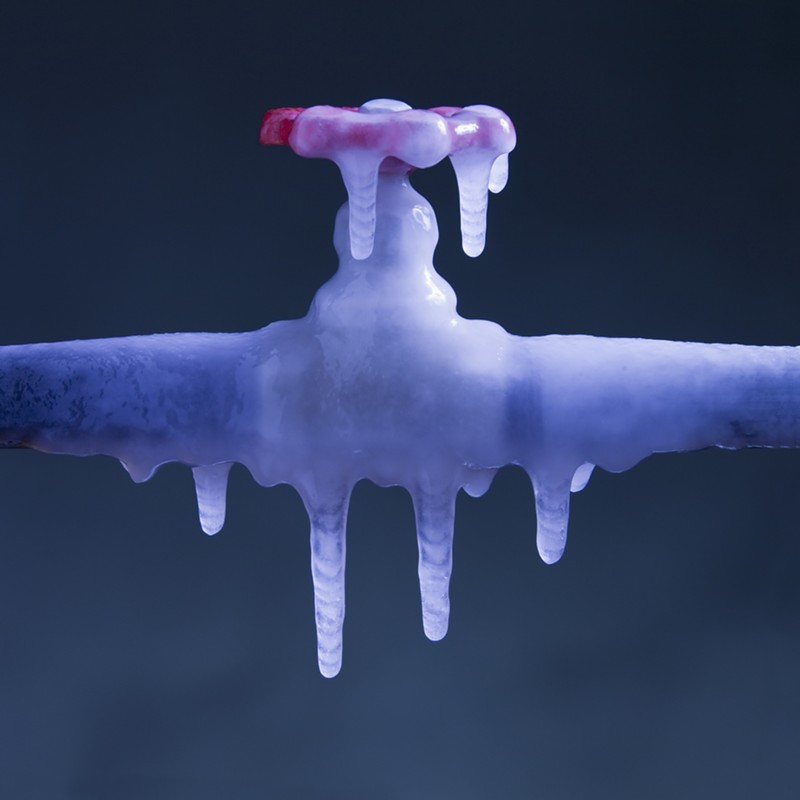As Denver prepares to descend into an apocalyptic Arctic frozen tundra, one of the biggest concerns for folks in the metro area will be how to protect pipes at home from freezing, especially if they're heading out of town for the holidays. Frigid weather — Denver and other parts of Colorado may see a wind chill of 50 below zero this week — can lead to a burst pipe, which can be an expensive disaster for a homeowner.
But there are experts out there who know how to defend against burst pipes, like Michael Britton, owner of Professional Plumbers Denver, who spoke with Westword about prevention tips and how to handle pipes that do burst.
"Before even the freeze, [homeowners] need to locate where the main shut-off valve for the house is," Britton says as he's driving to Boulder to insulate pipes in the lead-up to the looming cold weather. "Even if the kid is alone at the house, he needs to know where the shut-off valve is."
Aside from knowing how to shut off the water supply, homeowners should also make sure the valve is working. Britton notes that a little WD-40 can help do the trick to ensure that the valve moves.
After that, those who are staying in Denver for the holidays will need to figure out where the pipes in their home are exposed, such as in a basement, garage or attic.
"For example, if the copper pipes are in the crawl space, and the crawl space is not protected, and there are uninsulated copper pipes, with these kind of temperatures, the pipes will most likely burst," Britton says.
One method for warming up a crawl space would be to place a heater in it, according to Britton. But that's more of a stopgap solution. The best strategy is to insulate the pipes, which homeowners can do by purchasing insulation from a store like Home Depot and installing it themselves. Another option is to get a plumber to install commercial-grade installation, which Britton notes is of the most protective quality.
Asked if there is any MacGyver-type solution for fixing pipes when homeowners are scrambling, Britton is unable to come up with one: "They need to go to Home Depot right now."
If homeowners are truly unable to get insulation in time, they should turn on the faucets in the house and leave the water dripping, according to Britton.
"A lot of people won't do it because it will drive them crazy," Britton says, noting that it's still worth the irritation, since the steadily dripping water can help prevent a burst pipe.
Those who are leaving Denver for holiday vacations and are concerned about pipes bursting should turn off the water supply from the street outside their homes, then open the faucets to flush out all the remaining water before you go. In addition, leave the thermostat at 65 or higher, if you can afford it.
"That should prevent any pipe bursting," Britton says.
But if the nightmare scenario of a pipe bursting does happen, a homeowner should "right away, shut off the water for the house, and then call a plumber," he adds.
Although he wishes it weren't the case, Britton expects to receive a lot of calls in the coming days for burst pipes, many of which will happen after the initial frozen water thaws, causing the actual burst.
"I'm expecting a crazy, crazy day with pipe bursts," he says.
[
{
"name": "Air - MediumRectangle - Inline Content - Mobile Display Size",
"component": "12017618",
"insertPoint": "2",
"requiredCountToDisplay": "2",
"watchElement": ".fdn-content-body",
"astAdList": [
{
"adType": "rectangle",
"displayTargets": "mobile"
}
]
},{
"name": "Editor Picks",
"component": "17242653",
"insertPoint": "4",
"requiredCountToDisplay": "1",
"watchElement": ".fdn-content-body",
"astAdList": [
{
"adType": "rectangle",
"displayTargets": "desktop|tablet"
},{
"adType": "rectangle",
"displayTargets": "desktop|tablet|mobile"
}
]
},{
"name": "Inline Links",
"component": "18838239",
"insertPoint": "8th",
"startingPoint": 8,
"requiredCountToDisplay": "7",
"maxInsertions": 25
},{
"name": "Air - MediumRectangle - Combo - Inline Content",
"component": "17261320",
"insertPoint": "8th",
"startingPoint": 8,
"requiredCountToDisplay": "7",
"maxInsertions": 25,
"watchElement": ".fdn-content-body",
"astAdList": [
{
"adType": "rectangle",
"displayTargets": "desktop|tablet"
},{
"adType": "rectangle",
"displayTargets": "desktop|tablet|mobile"
}
]
},{
"name": "Inline Links",
"component": "18838239",
"insertPoint": "8th",
"startingPoint": 12,
"requiredCountToDisplay": "11",
"maxInsertions": 25
},{
"name": "Air - Leaderboard Tower - Combo - Inline Content",
"component": "17261321",
"insertPoint": "8th",
"startingPoint": 12,
"requiredCountToDisplay": "11",
"maxInsertions": 25,
"watchElement": ".fdn-content-body",
"astAdList": [
{
"adType": "leaderboardInlineContent",
"displayTargets": "desktop|tablet"
},{
"adType": "tower",
"displayTargets": "mobile"
}
]
}
]












